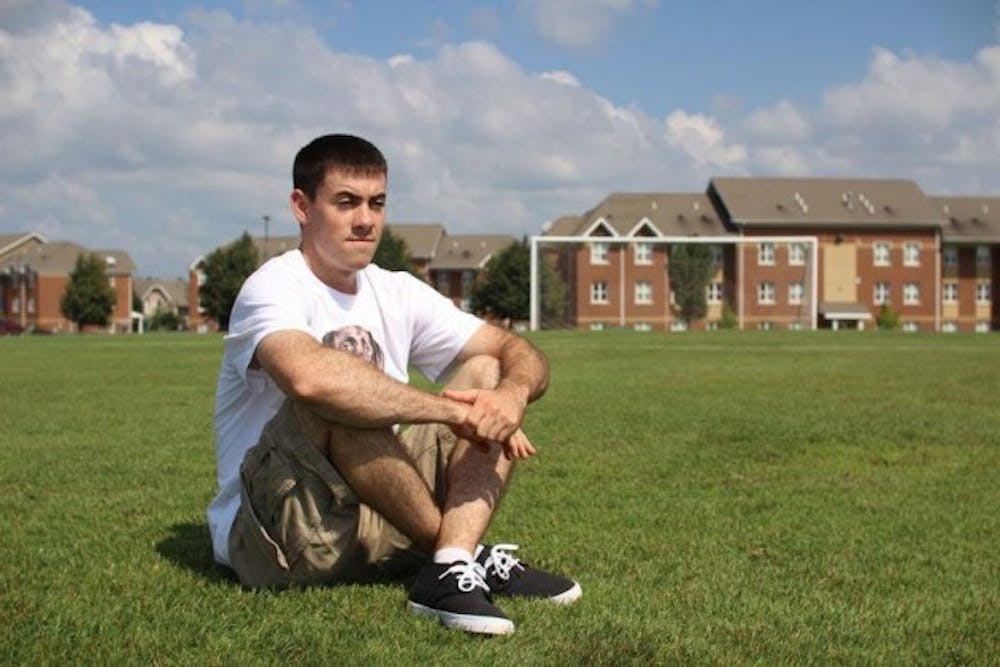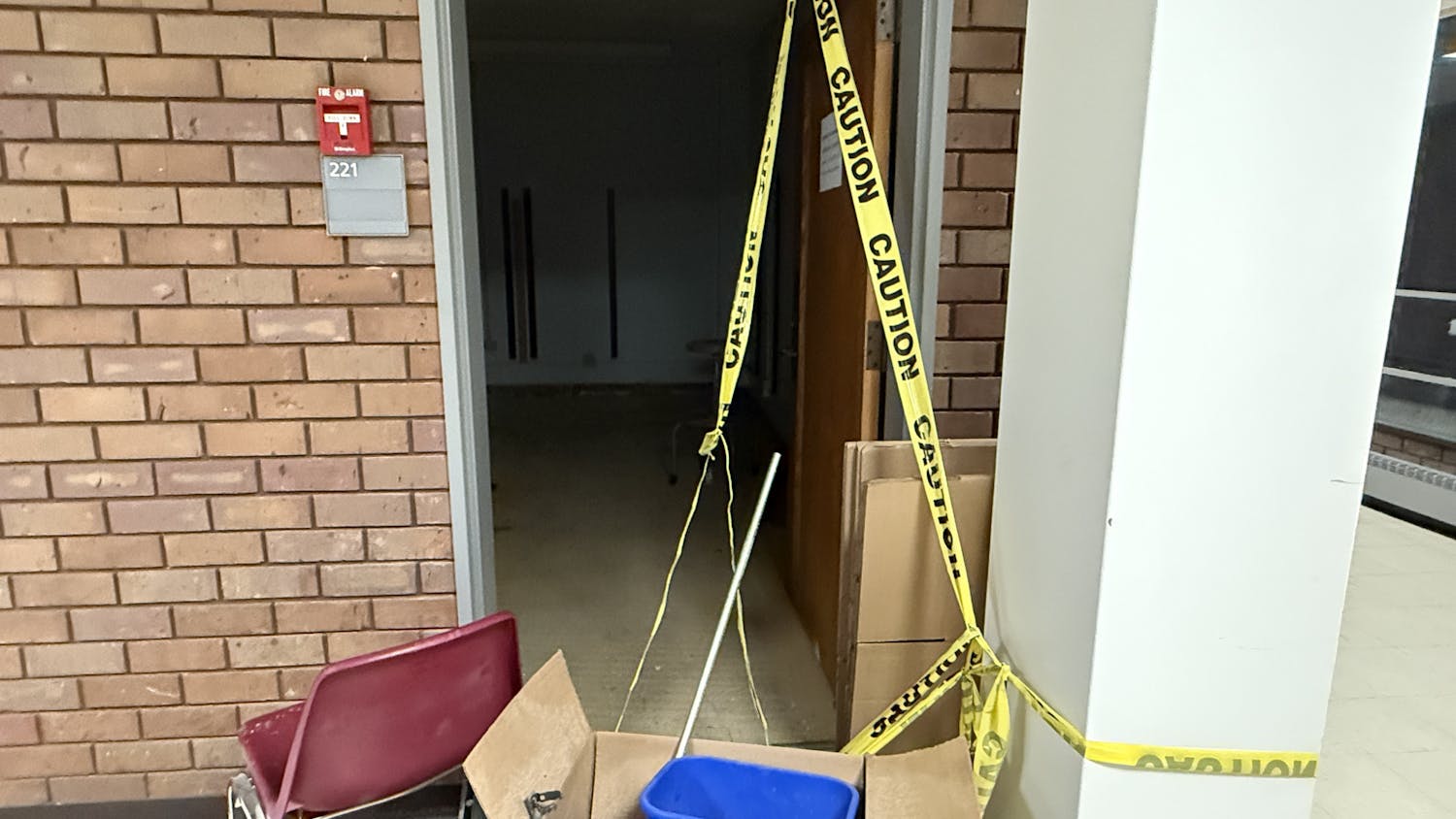Michael Vaughn stood on a small table as he peered over a 6-foot-tall wooden fence in his backyard in Liverpool, N.Y. But he didn't stay stationary long. Lingering for even a few seconds could be the difference between life and death.
A man was unconscious at the bottom of a neighbor's in-ground pool. Vaughn, who was certified in CPR just a month prior, put what he learned into action.
The senior pre-physical therapy major's bout of heroism happened on Aug. 19, just a few days before Vaughn was to start his last semester at UB. Because of a touch of serendipity, Vaughn was able to save a life that Monday morning. If the former history major were still on path to become a teacher, he likely wouldn't have undergone CPR training.
But Vaughn's mother, who encouraged Vaughn to intervene in the incident, and friends aren't surprised by his life-saving actions and innate ability to stay cool under pressure.
"You learn to expect the unexpected with Mikey Vaughn," said friend Patrick Smith, a graduate student in the physical therapy program.
Vaughn, 23, and his mother, Kelly, heard fits of panic and yells in Spanish, through their open windows, coming from a neighbor's yard. Vaughn was in his room packing clothes up for school, and when Kelly decided the two had to help, Vaughn didn't berate his mother for being too nosey - he agreed they had to get involved.
"OK mom, let's go," Vaughn said, as the pair dashed outside from their home's second story.
Kelly put a little table in place so Vaughn could get over the fence. He saw a 225-pound, 44-year-old man lying unconscious at the bottom of the pool. Panic engulfed the backyard as a distraught relative tried to reach the man, who was visiting from Costa Rica, with a pool skimmer. Vaughn said it appeared the man's relatives didn't know how to swim.
He leaped over the fence without hesitation. He stood at the edge of the pool. "Breaths first or pumps first?" he asked himself as he removed his socks and glasses. The training he received a month ago needed to be recalled instantly.
"There's something about me where I don't really react like a normal person should," he admitted.
Vaughn, who had just completed a triathlon the day before, is methodical and has a tendency not to panic in intense situations. He was mugged while studying abroad in South Africa in spring 2012 and, even then, he doesn't remember getting flustered.
Removing his socks, albeit not most people's first reaction, gave him a few seconds to prepare himself and focus on what he needed to do, he said.
This wasn't like a triathlon.
The day before, he accidently swallowed a mouth full of water as he swam swiftly and was intently focused on completing the 1,000-meter swim of the three-part competition. In the triathlon, Vaughn knew what to expect. He practiced. He prepared. He had run through the day's motions before as he trained.
But the only experience he had with CPR was on practice dummies in the 8-hour course he took - a course he only took as a technicality because it was required in order to apply to the University of Maryland's physical therapy school - the only one of the five schools he applied to with such an admissions requirement.
In the triathlon, Vaughn had a watch he'd use keep track of his pace. But when he dove into the pool to retrieve the man, his perception of time was lost. There wasn't a steady pace to follow - he just knew he had to get the man above water as soon as possible. And he thought he had to do it alone.
Though the family and another neighbor gathered, Vaughn was the only one capable of hoisting the man out of the pool. Vaughn, who stands at 5-foot-7 with an athletic build, was intimidated by maneuvering the man out of the water alone. But another neighbor appeared - a former nurse - who was able to help pull the man on land.
The man was unconscious and didn't have a pulse.
Time was warped. Fifteen seconds felt like an eternity. He began performing the pumps and breaths necessary to revive the man.
The former nurse stepped in and assisted Vaughn with the pumps as he continued trying to fill the man's lungs with air. After three CPR cycles, the man started spitting up water. He vomited. His heart was beating and he was breathing. Ambulances arrived shortly after.
Vaughn estimates the whole ordeal took about four minutes, but it felt a lot longer.
"If I didn't know CPR, he probably would have gone another three or four minutes without breathing," Vaughn said. "The brain is just going to shut off after that."
The America Heart Association reports 70 percent of people "will feel helpless" when someone around them has acardiac emergency because they don't know CPR or have a lapse in training.
The man Vaughn saved was in critical condition the day of the incident, according Syracuse's newspaper The Post-Standard's website.
Vaughn wouldn't comment about the victim beyond confirming he was alive and adding the thankful family told him he'd always have a home in Costa Rica.
The man's niece didn't even see Vaughn hop over the fence, but rather saw a guardian angel lift her uncle out the water, according to Kelly, who also spoke with the man's family.
Vaughn said his one-day training also consisted of first aid and automated external defibrillator (AED) training, which certified him to use the portable electronic device. UB offers the same kind of training in combination with the American Heart Association within the Recreation & Intramural Services department located at South Campus' Clark Hall.
For Vaughn, applying to graduate school wound up preparing him to save a life, but he never expected to have to use his training. Now he knows how valuable it is.
And his hometown and its local media took notice. Over a week after the incident, his mother was still fielding phone calls and text messages from people who are just as proud of her son as she is.
She remembers a trip to the Adirondacks about seven years ago when Vaughn instinctively pulled up his little cousin, who slipped under water while in a hot tub.
"He reacts quickly," Kelly said.
Vaughn also lends that skill to the field. He's a club soccer legend at UB, according to Smith, who met Vaughn through the league. Vaughn has played for the team for the past five years.
"He's a little guy," he said. "But as soon as he starts to play, people realize who he is."
"He dominates," Smith added.
His athletic lifestyle fits in perfect with his decision to shift into physical therapy after completing a degree in history.
"As someone who does triathlons, who loves to move and run, I want other people to be able to do that after they're hurt," Vaughn said.
Friend Mollee Thomas, an occupational therapy graduate student, described Vaughn as "fun-loving" - she's amazed by his life-saving actions but is familiar with his caring nature.
Vaughn isn't one to sit by and not get involved when he knows he can help, she explained.
"And he always has some sort of story to tell," Thomas said.
And now Vaughn has another story to add to what friends describe as an already extensive list - but it's more than just a story a community has already shared all over Facebook.
It's something people can learn from. Vaughn urges those who are CPR trained to assume nothing when facing an emergency and to stay calm and focused.
Throughout August, three young people, including Vaughn, each saved an individual from drowning in the Syracuse area.
"These things happen," Vaughn said. "It would be the worse feeling to be there and not know what to do."
Email: news@ubspectrum.com





